How African Creatives Are Redefining Travel, Cuisine, and Mobility Across
Trending
Tuesday June 17, 2025
Trending
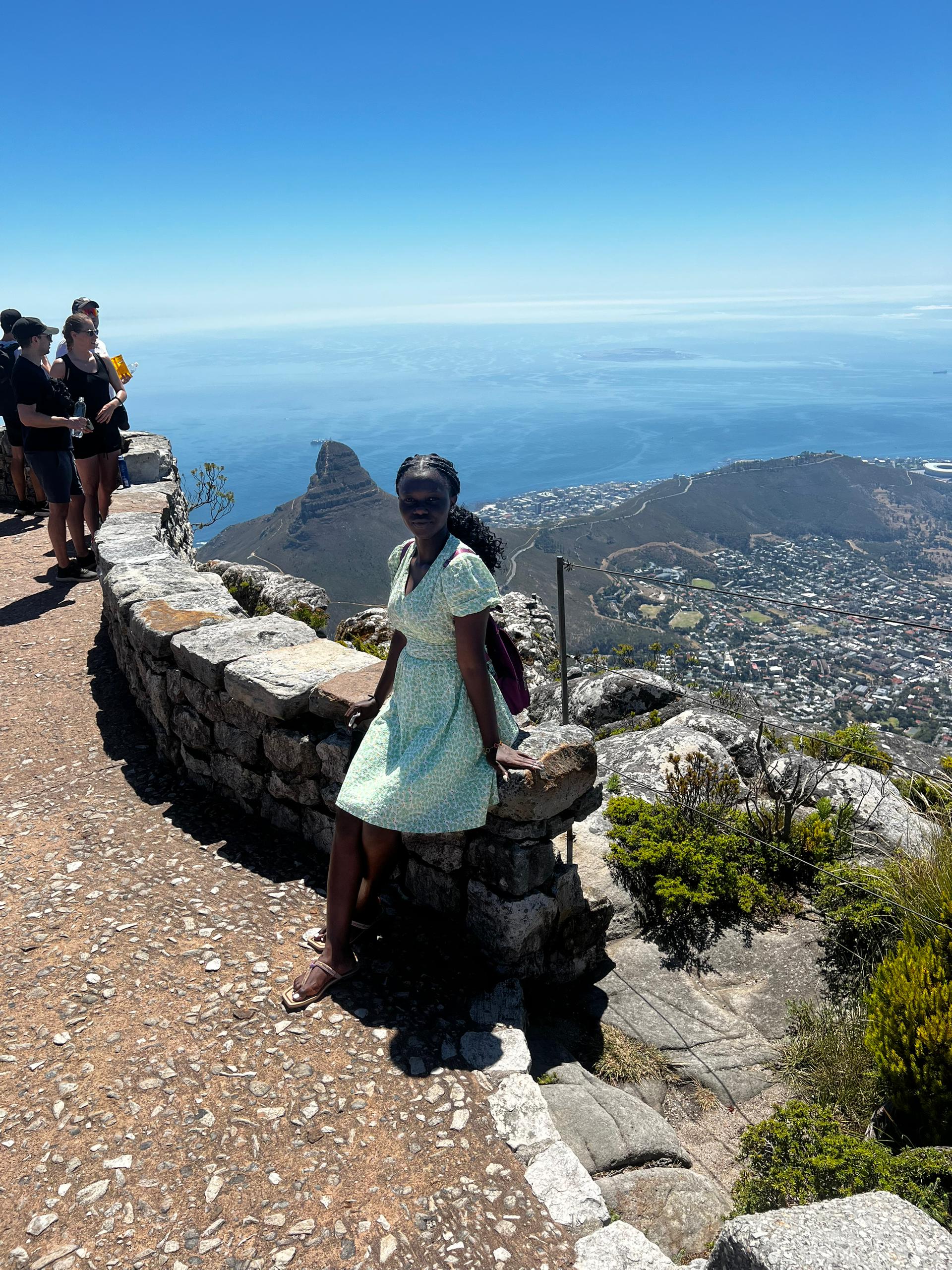
In a continent where borders often define limitations, a new generation of African content creators is challenging these constraints, weaving narratives that transcend lines on a map.
One of them is Nigerian travel storyteller Esther Okorougo, whose bold lens and heartfelt narratives are carving a space for African women to imagine mobility differently. Her journey began not with luxury or influence, but with a simple decision in 2022 to take her first international trip to Ghana.
 Esther Okorougo is a Nigerian visual storyteller and content creator who curates Afrocentric fashion, food, and culture to reimagine how Africa is seen. Credit: Dangzz Photography
Esther Okorougo is a Nigerian visual storyteller and content creator who curates Afrocentric fashion, food, and culture to reimagine how Africa is seen. Credit: Dangzz Photography
“Growing up, travel felt like something only certain people could do, especially for young African women who are expected by society to just wait around until they’re married before they start exploring life,” she told AWiM.
That trip was more than a getaway; it was a shift in mindset.
“I wanted to show Africans that it’s possible to explore our beautiful continent, but more importantly, I wanted women to see themselves through my story and know that they can move, they can explore, and they can live fully,” she added.
From the welcoming streets of Kigali to the vibrant food stalls of Cotonou, Esther has travelled across Rwanda, Kenya, Togo, Benin Republic, and Ghana, and with each stop, her following has grown, not just in numbers but in purpose.
“It hit me during my second trip to Benin Republic, people kept asking if the beaches and food I posted were really from Benin. That’s when I realised my content was reshaping perceptions, showing people a different Africa,” she recalled.
Esther’s travel style is grounded in accessibility. She’s a border traveller who listens to her audience and crafts her routes based on curiosity and affordability. Her viral posts, such as “budget destinations under $100” and “affordable countries for girls’ trips,” are designed to demystify travel for young Africans.
But it’s not just where she goes, it’s how she tells the story. Food, for Esther, is a passport of its own.
“I don’t think African cuisine gets the attention it deserves in global travel content. When I tried wagassi cheese by the roadside in Benin, listening to the local vendor explain how it was made, I felt a deep connection. Through food, you get to really feel the soul of a place,” she said.
Among her favourite destinations is Rwanda. “I love how eco-conscious they are. As a sustainable travel advocate, it really stood out to me and the people were just so warm, very welcoming, very patient. I can’t wait to go back,” Esther chuckled.

Esther glides through the Rwandan landscape on a zipline
“Beyond the beauty and hospitality, Esther has found something more powerful: impact. “So many people now message me saying they booked a trip after watching my videos. Some had never even considered travelling until they saw that it could be affordable and fun,” she told AWiM.
She remembers sitting in Rwanda with a group of young Africans who had never visited the neighbouring countries just hours away. “By sharing my story, they felt encouraged to start from nearby, instead of just dreaming of places far away.”
For Esther, every post, every video, every caption is part of a larger mission: breaking both visible and invisible barriers. “We are showing people that travel is possible, no matter your background, and that Africa is beautiful, safe, and worth exploring,” she said.
Her community now stretches across borders, her comment sections transformed into mini travel forums where followers ask questions, offer suggestions, or even plan trips together.
Stepping into this same spirit of purpose-driven travel is Ghanaian content creator Saviour Deity, known to his followers as Flying Flags. Unlike Esther, whose lens centers on women-led narratives, Saviour’s mission unfolds on two wheels, with a motorbike, a map, and a firm belief that Africa can be united not only in ideology but through lived experience. His journey is less about speed and more about stitching together stories across borders.
His first taste of what would become a long-distance passion began in northern Ghana while serving as a student missionary. “I bought my first motorcycle brand new. Within a week, the odometer hit 1,000 kilometers. That moment made me realise what was possible,” he told AWiM.
Not long after, he rode the same bike from the country’s northern region to the capital in Accra, and that, he said, redefined everything.
Since then, Flying Flags has travelled through all 16 regions of Ghana and ventured far beyond, visiting over 13 countries across West, Central, Southern, and East Africa, including Togo, Angola, Zimbabwe, South Africa, and Kenya.
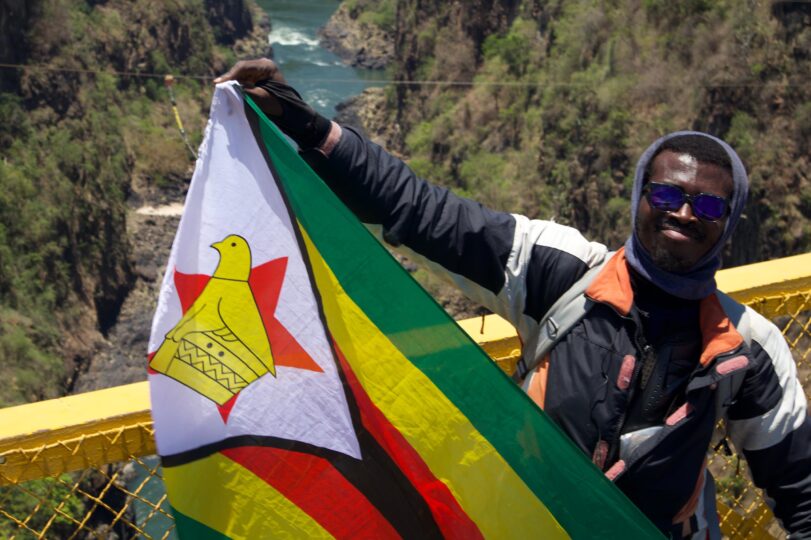 Saviour Deity raises the Zimbabwean flag at Victoria Falls, a signature salute to every nation he visits, blending pride, presence, and purpose in every stop.
Saviour Deity raises the Zimbabwean flag at Victoria Falls, a signature salute to every nation he visits, blending pride, presence, and purpose in every stop.
What’s unique about him isn’t just the route, but the ride. “I love to ride, and I don’t have a big budget for air travel or public transport,” he explained. “Motorcycle travel is economical, reliable, and it gives me the freedom to stop when I want, connect with people, and go where buses or planes can’t. It symbolizes freedom and ambition; it’s unusual to see someone ride a bike across multiple countries, and that alone tells a story.”
From roadside interactions with curious children to spontaneous conversations with village elders, his bike has unlocked human connections that defy borders. In Malawi, he said, the hospitality was so generous it “felt like home.” In Kenya, strangers became family. “Africa has taught me what an African community really looks like. When people say, ‘you’re not a stranger here,’ it humbles you,” he added.
But Saviour’s story isn’t just about adventure, it’s about reshaping perception. As someone from Ghana, a country central to Pan-African history, his travels are rooted in a deep love for the continent and its people. “I felt Pan-African even before I left Ghana,” he said. “And when other Africans welcomed me into their homes, shared their food, their time, their stories, it confirmed that this identity is real. That belonging sparks love, service, tolerance, and unity.”
Watch the documentary here:
His most viral video, a quiet moment at the signpost marking Mpumalanga Province in South Africa, has reached over 1.3 million people. Just him, his bike, and the border. “People couldn’t believe I rode from Ghana to South Africa. It made them curious, made them dream,” he said.
For every like, share, and comment, there’s something more enduring: inspiration. “Some of my followers tell me they’ve started planning trips because of my content. Others ask for tips or say they never thought this was possible. But now they know it is,” he said.
In many ways, Saviour’s journey is a moving classroom, one that teaches its lessons on the roadside, not in a lecture hall. It’s a story told not just through landscapes, but through the lives of the people he meets.
His reflections on African identity, hospitality, and the power of movement find a powerful echo in the story of Kimora Smith Mensah known by her social media followers as EfyaKimora, a Ghanaian travel content creator, tour guide, and consultant whose journey is rooted in a deep curiosity about the continent and a mission to inspire others to explore it.
“As a travel content creator, I’m always excited to share the things I personally experience on the ground,” she told AWiM. “The culture, the food, the people, the environment, anything that makes a country unique and special. It gives me so much pleasure.”
For Kimora, food has become a vibrant entry point into understanding culture. “When I started exploring, I also started trying new things, especially food. I love it,” she explained.
“Culture isn’t just about dance or tradition, it’s also about what people eat and how they eat it. Respecting culture means respecting food.”
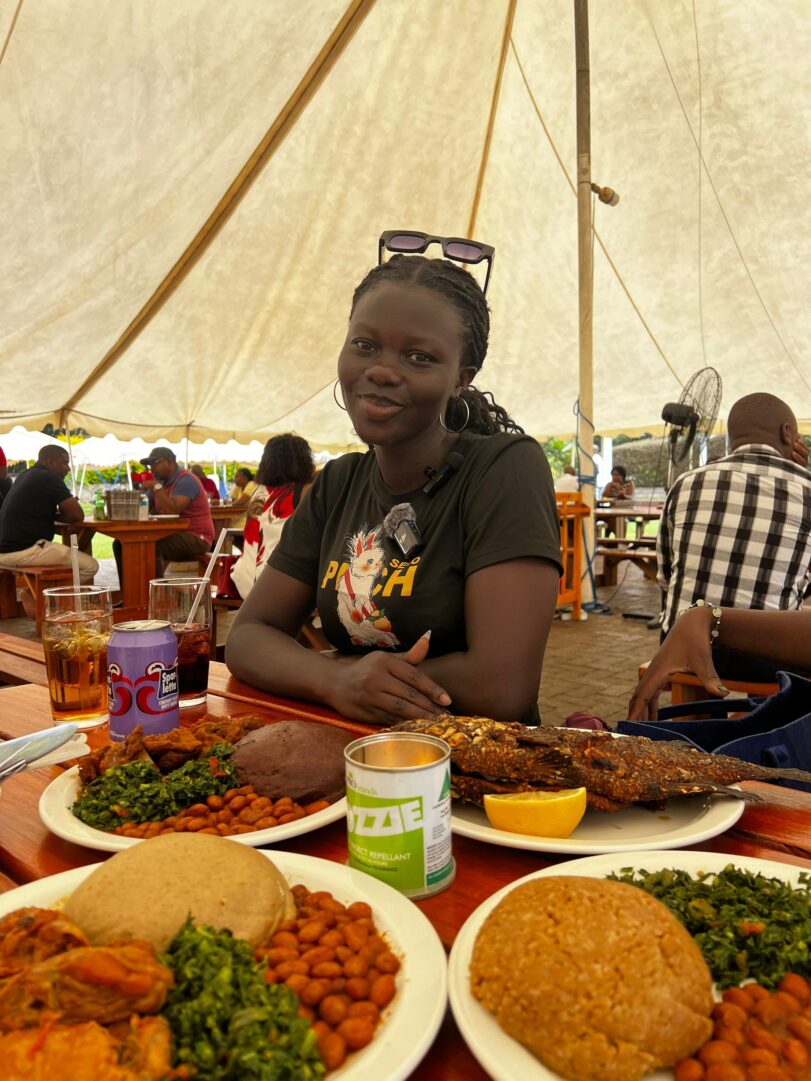
Kimora Smith Mensah sits before a steaming plate of sadza, soaking in the moment before tasting Zimbabwe’s staple food for the first time.
Her love for travel is more than personal passion; it’s a way of storytelling.
“I don’t just travel and keep it to myself; I share it online, and people watch me. They get motivated,” she said with a smile. Kimora recounts how a woman from Guinea-Bissau messaged her after seeing one of her vlogs, saying she visited Liberia because of it. “Now, so many people want to go to Burkina Faso because I went there and shared the beauty of that country,’’ she told AWiM.
Her platform, she emphasized, is about more than just places; it’s about changing how people view the continent. “It’s a way of letting people know what’s happening in other parts of Africa, it’s changing perceptions. People are now considering these places not just for tourism, but for business, work, and more, she explained.”
Kimora sees digital content creators as vital to reshaping Africa’s image. “If you really want to know about an African country, don’t rely on traditional media; follow a content creator who shares real, on-the-ground experiences. We’re showing that Africa is also a great continent in a way you’ve never heard or seen before,” she told AWiM.
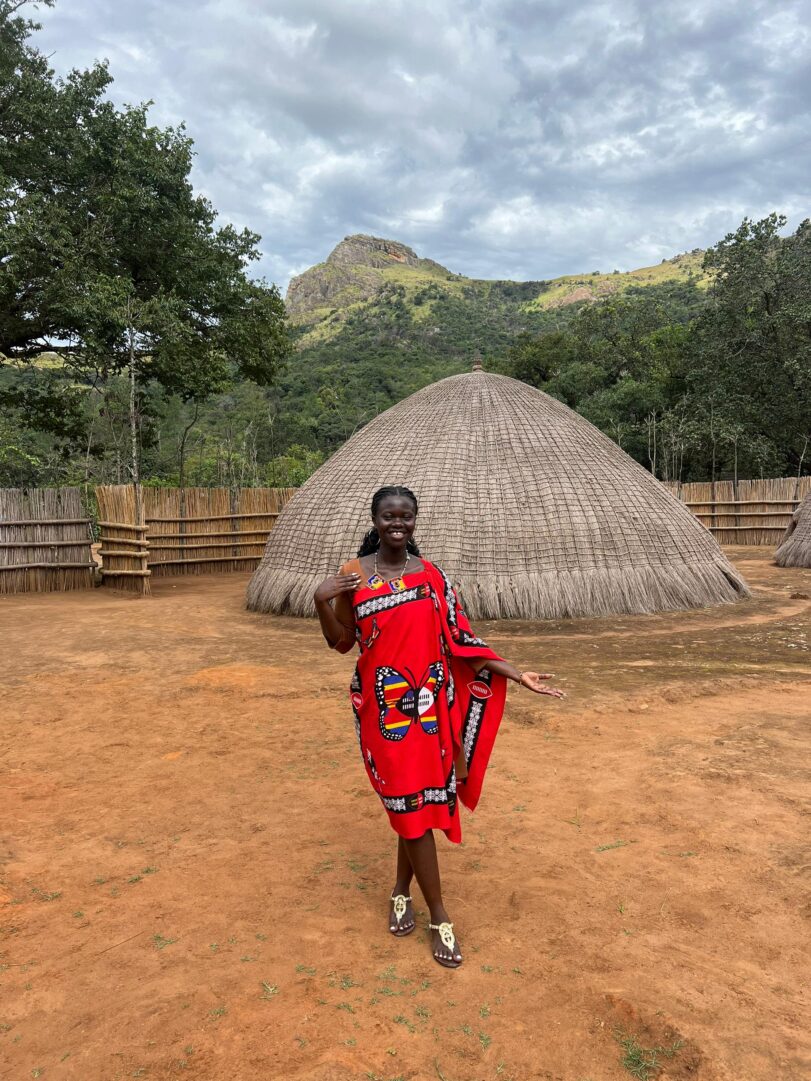 Standing tall at Mantenga Nature Reserve and Cultural Village, Kimora Smith Mensah embraces the spirit of Eswatini, where culture, history, and nature come alive.
Standing tall at Mantenga Nature Reserve and Cultural Village, Kimora Smith Mensah embraces the spirit of Eswatini, where culture, history, and nature come alive.
Her dream to tell Africa’s story “the African way” is part of a much larger shift, one where African voices are reclaiming the narrative, one video, photo, and caption at a time. These creators aren’t just influencing travel trends; they are challenging outdated stereotypes and inviting the world to see Africa for what it truly is: vast, vibrant, diverse, and full of potential.
And the numbers reflect this growing momentum.
 According to the African Union, intra-African travel has grown by over 20% in the past five years, a figure fueled in part by the African Continental Free Trade Area (AfCFTA) and visa-free or visa-on-arrival policies now adopted by many countries. Ghana, Rwanda, Kenya, and Benin, for instance, have opened their borders to African nationals, making it easier for content creators and everyday travelers alike to move freely and tell new stories.
According to the African Union, intra-African travel has grown by over 20% in the past five years, a figure fueled in part by the African Continental Free Trade Area (AfCFTA) and visa-free or visa-on-arrival policies now adopted by many countries. Ghana, Rwanda, Kenya, and Benin, for instance, have opened their borders to African nationals, making it easier for content creators and everyday travelers alike to move freely and tell new stories.
Social media, too, is playing an unprecedented role. A 2023 report by GeoPoll, a company that uses a mobile platform to conduct surveys and gather data from individuals in developing countries, found that 74% of young Africans aged 18–35 follow at least one African travel or lifestyle influencer. For many, these creators are trusted sources of inspiration and information, more relatable and authentic than traditional travel platforms.
“The growth of African travel content is not just about aesthetics or wanderlust,” said Kenyan media scholar and cultural analyst Dr. Mercy Obuya. “It’s also about identity, healing, and pride. We’re witnessing a cultural reawakening, and travel creators are central to it.”
Ordinary followers echo that sentiment.

“I used to think traveling across Africa was impossible unless you were rich, but after watching videos from African content creators, I realized we have so much beauty right here and we don’t need to wait for anyone else to discover it first,” said Samuel Chibwe, a university student from Zambia.
Similar thoughts are echoed by Sophie Ateba, a Cameroonian living in Germany. “These creators are changing how people in the diaspora see home. Instead of hearing about poverty or conflict, we’re seeing joy, innovation, and nature. It makes me proud and homesick in the best way,” she said.
The influence stretches far beyond African borders.
“I had no idea what modern-day Africa looked like until I started following African creators on Instagram, they’re showing places and people that just aren’t represented in Western media. Now my dream trip isn’t to Europe, it’s to Senegal or Ghana said Hannah North, a university student in Canada.
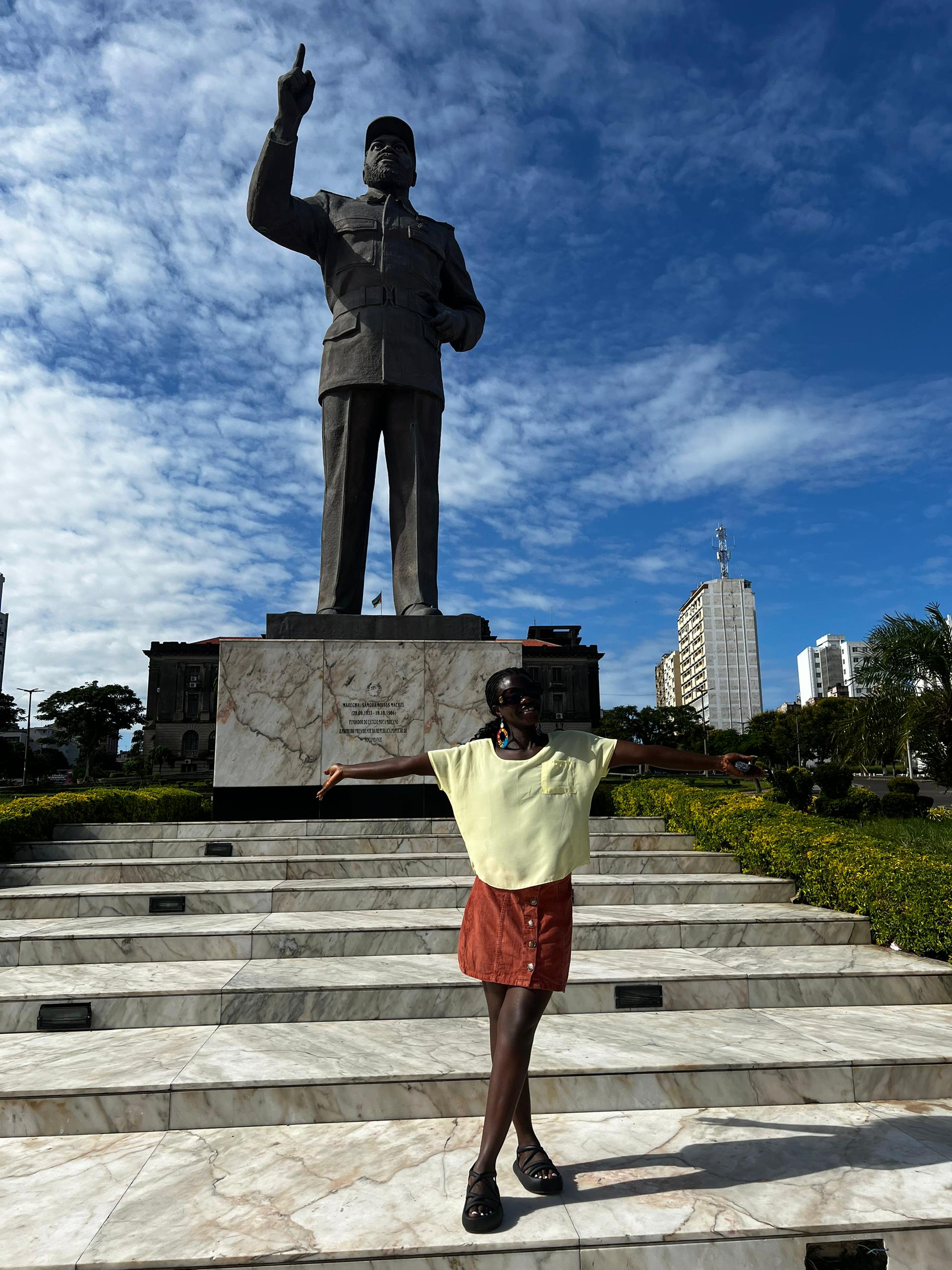 Yet even with the optimism and cultural pride that fuels their storytelling, these creators remain clear-eyed about the realities of traveling across the continent.
Yet even with the optimism and cultural pride that fuels their storytelling, these creators remain clear-eyed about the realities of traveling across the continent.
Esther, whose journeys have mostly taken her by air, speaks of a largely seamless experience when visiting destinations such as Rwanda and Kenya, where open visa policies are making mobility easier. But for overland explorers like Kimora and Saviour, the road offers rich discovery and human connection, though not without its challenges.
For Saviour, unlocking smoother travel across Africa lies not only in government action but in how Africans view one another. “Governments need to work together to make it easier for Africans to move, but we also need to change how we see one another. Sometimes, the biggest borders are mental. We’ve been made to believe our neighboring countries are unsafe or too different. But on the ground, we’re more alike than not,” he told Mary.
Both Saviour and Kimora see immense opportunity in advancing free movement across the continent. “Once people can move freely, they’ll invest, they’ll trade, they’ll connect,” Kimora noted.
For creators like them, each trip is proof that more connected African societies are both possible and desirable. Their experiences on the road highlight a wider policy conversation that is steadily gaining momentum. In 2018, the African Union adopted the Protocol on Free Movement of Persons, an ambitious framework designed to grant African citizens visa-free access, residence, and the right of establishment across member states.
While implementation has been slow, with only a handful of countries including Rwanda, Niger, Mali, and São Tomé and Príncipe having ratified it so far, champions of the protocol remain hopeful about its transformative power.
During a 2023 national dialogue hosted by the AU Economic, Social and Cultural Council (ECOSOCC), William Carew, Head of Secretariat, called on civil society to help accelerate progress.
“The adoption of the FMP stands as a testament to our collective aspirations for continental integration and economic prosperity,” he said. “I call on you to push member states to take action whenever they drag their feet. Everyone in this meeting is to be an ambassador of change around the FMP conversation.”
That sentiment was echoed by Rwanda’s Minister Judith Uwizeye, who linked the protocol’s success directly to the goals of the African Continental Free Trade Area (AfCFTA). Speaking at an AU event on economic integration, she stressed: “Without mobility and free movement, even the AfCFTA will stay challenged, as we cannot achieve free trade properly without free movement.”
Institutional backing is also growing. The African Union’s Peace and Security Council, during its 661st meeting in Addis Ababa, declared: “The benefits of free movement of people, goods and services far outweigh the real and potential security and economic challenges that may be perceived or generated.”
With political will building and grassroots voices growing louder, the push for free movement continues to gather strength. And as young Africans like Esther, Saviour, and Kimora are already demonstrating, true integration is not just a policy dream; it is a journey already underway, one road, one story, and one border at a time.
As their journeys show, the freedom to move is doing more than opening up new travel routes; it is creating new spaces for connection, cultural exchange, and pride in Africa’s diverse heritage.

With each crossing, each video, and each shared story, these creators are helping Africans see and celebrate their continent through their own eyes and inspiring others to do the same. From local cuisines to untold histories and vibrant communities, what is being exchanged goes far beyond tourism; it is the building of a more open, unified African identity.
While barriers remain, the continued push toward greater freedom of movement, backed by the AU Protocol and growing civil society momentum, is already shifting the narrative. And with a new generation of creators helping to lead the way, the future of African travel looks not only more connected but also more dynamic, inclusive, and full of possibility.
Disclaimer: “This content is produced as part of the Move Africa project, commissioned by the African Union Commission and supported by the Deutsche Gesellschaft für Internationale Zusammenarbeit (GIZ) GmbH. The views and opinions expressed are those of the authors only and do not necessarily reflect those of the GIZ or the African Union.”
We’re not gonna spam. We’ll try at least.

Copyright 2020. African Women In Media
Copyright 2020. African Women In Media
Recent Comments